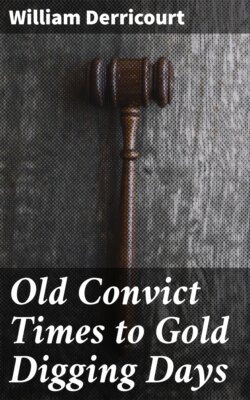Читать книгу Old Convict Times to Gold Digging Days - William Derricourt - Страница 14
На сайте Литреса книга снята с продажи.
CHAPTER I.—THE CONVICT DEPOT.
ОглавлениеTable of Contents
On first landing from the ship at Hobart Town we were all ranged up round the yard called the Hobart Town Tench. This place had a church in one corner and a treadmill in the other, besides various offices. The superintendent was a man named Gunn. He was six feet five inches high, but had only one arm, the other having been shot off by bushrangers. The first to inspect us was the Governor himself, Sir John Franklin,* who addressed to us a long harangue on the advantages to be gained from good conduct, and the consequences sure to follow bad conduct or breach of discipline. Under the old system men immediately on arriving could be assigned to masters and marched off to their allotted work. But when we arrived a different plan was in force. Ours and the three vessels that had arrived just previously—the Hindostan, the Canton, and the Mandarin—were what were called probation ships, that is, according to the length of sentence, each man on board had to do a certain probationary term. Among our men there were three Joneses—one a seven years man, one a lifer, and myself, ten years. The first Jones had to go through a probation of twelve months, the lifer one of two years, and I fifteen months. If during these several terms of service no damaging complaint of our conduct was made we could be assigned to masters. On the other hand, if for breach of discipline we should be punished by imprisonment for any term, we should have to do that term first, and then finish our probation period. In the distribution of our men about a hundred were stationed in Hobart Town, and the others were scattered over the different probation stations.
[*Sir John Franklin, the celebrated Arctic explorer, was Lieutenant-Governor of Van Dieman's Land from January, 1837, to August 21, 1843.]
My first work was breaking stones in the Domain, half a yard of two-inch stone being the allotted daily task for each man. On the Saturday afternoon we were allowed to go into the town and get small jobs of work, such as chopping wood, sweeping yards, and cleaning up for Sunday. I was at this for about a month, and had earned what was known as a "holey dollar," that is, a dollar with a piece punched out of the middle. The punched out piece was called a "dump," and was valued at thirteen pence. In return for our Saturday afternoon's work we would get quantities of scraps of food, saved up on purpose during the week, and often, if there were any government women about the places where we were employed, some tea or coffee. As for myself I lived like a fighting cock, having abundance of fruit of all sorts. The result was a rather serious attack of dysentery. So well were we supplied that the ordinary rations were often neglected. We used to take our tea or coffee in our cans, and get hot water from the cookhouse. During this time I became moon-blind through lying about the yard and gazing at the moon. For a long time I was, because of my complaint, quite unable to distinguish objects after dark, though my sight was all right during the day.
The stone broken in the Domain had to be carted to various parts of the town in what were called go-carts, to which five men were yoked up, four in front and one behind. A plaited collar was fastened to the pole of the cart, which was moved both by pulling and pushing. One day, passing along Macquarie-street with this cart, we saw either three or four men ranged up on the drop of the gallows, just ready to be turned off. I noticed that a priest was in attendance, and I asked the sub-overseer whether all the men who were going to be hanged were Roman Catholics. He told me no, but that the priests were much more attentive to the condemned prisoners than were the parsons; and that, moreover, as Englishmen did not care to die with empty bellies, and were sure of having plenty to eat under the priests, many of them turned Catholics before execution.
Still suffering from dysentery, I was not able to do my full half-yard of stone. Captain Cheyne, the road superintendent, on riding up the rows between the heaps of metal, saw that my pile was always short. Complaint was made against me as an idle fellow, and I was sent up for trial and sentenced to seven days in solitary confinement. Getting worse instead of better, I soon got into disgrace again. I was thought unwilling to work, and was shifted into Dicky Cloke's gang at the stone quarry in the Domain, to do guttering and grooving. Dicky was well known as a regular Tartar. He used to say that anyone placed under him would either have to work or he would break his heart. Through the shaking of the heavy quarry pick my weakness increased. Cloke would not believe my excuses, and I was again sent for trial and sentenced to three months with a party at Sandy Bay. Here began my long series of troubles.
